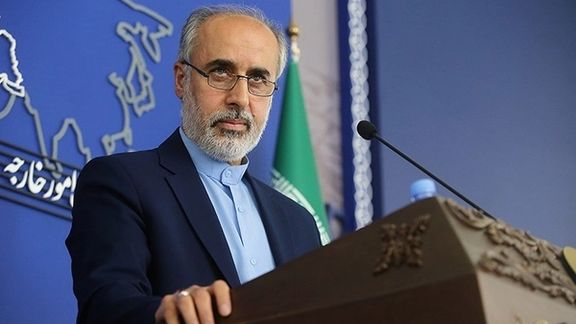Iran Says No Haste In Nuclear Talks Although Hopes For A Deal

Iran would like to see a nuclear agreement taking shape soon, but it will not act with emotion and haste, Iran’s foreign ministry spokesman Naser Kanaani said Monday.

Iran would like to see a nuclear agreement taking shape soon, but it will not act with emotion and haste, Iran’s foreign ministry spokesman Naser Kanaani said Monday.
Meanwhile, the head of the country's Atomic Energy Organisation, Mohammad Eslami said on Monday that Iran will keep the UN nuclear watchdog's cameras turned off until a 2015 nuclear deal is restored, the semi-official Tasnim news agency reported.
In a media briefing, Kanaani emphasized Tehran’s often repeated slogan that it will not hinge the future of the economy and people’s well-being on the nuclear issue.
The hardliner government of President Ebrahim Raisi and its supporters, who are loyal to Supreme Leader Ali Khamenei, argue that they can manage the country despite American sanctions, and a nuclear agreement is not absolutely necessary to deal with economic challenges.
However, as annual inflation approaches 60 percent and food price inflation is close to 90 percent, critics argue that a deal to restore the 2015 nuclear agreement, the JCPOA, is a prerequisite. Without lifting sanctions imposed by the United States and boosting oil exports and trade, the government simply has little money to deal with the economic crisis.
The United States imposed oil export and banking sanction in 2018 when former President Donald Trump withdrew from the JCPOA, demanding a stronger agreement. The move drastically weakened Iran's economy, which is heavily dependent on oil revenues.
The Raisi administration’s claim of dealing with challenges despite sanctions is a public posture to show the West that it is not desperate for a deal. On the domestic front, few believe that the situation will improve as they see that real food prices have doubled and tripled since the beginning of May.
But since the Biden administration took office, Iran has been able to increase its oil exports, mainly to China and many believe it is pinning hope on the additional income to weather out the storm and continue expanding the nuclear program.
Kanaani, however, did not dash hopes for an agreement saying that discussions do take place through “communication channels.”
A local news agency asked the spokesman about a recent statement by the head of the UN nuclear watchdog, the International Atomic Energy Agency (IAEA), Rafael Grossi, who said he had “very limited visibility,” of Iran’s nuclear program. He also said that only a country with military intentions would enrich uranium to 60-percent purity.
Kanaani responded with defiance. “We call upon him to refrain from politically motivated statements,” he said, and added that Grossi's remarks were "unprofessional, unfair and unconstructive views."
Iran began restricting IAEA’s monitoring access in early 2021, as the incoming administration of President Joe Biden signaled its readiness to return to the JCPOA and lift sanctions. Tehran announced more restriction after the IAEA Board of Governors passed a resolution on June 8 to censure Iran for lack of cooperation in its investigations.
Grossi told the Spanish newspaper El Pais June 22 that his agency’s ability to monitor Iran’s nuclear activities had substantially decreased as Tehran’s nuclear program is “galloping ahead.”